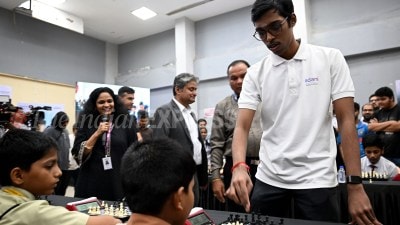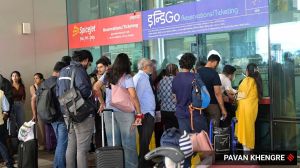AAP gen secy Sandeep Pathak: ‘Nine states go to polls this year. We are seeing where party chances high… decision matter of time’
“BJP fights like it does… Cong can’t blame people for own failure to convince them… People don’t vote for ideology but delivery”
 AAP's National General Secretary (Organisation) Sandeep Pathak (Express/File)
AAP's National General Secretary (Organisation) Sandeep Pathak (Express/File) Sandeep Pathak is one of the most influential leaders in the Aam Aadmi Party (AAP) hierarchy, second perhaps only to Delhi Chief Minister Arvind Kejriwal when it comes to its plans to expand nationally. Elected to the Rajya Sabha last April, Pathak was appointed the party’s National General Secretary (Organisation) last month. It was a recognition of his role in the AAP’s victory in Punjab last year and its entry into Gujarat – factors which have earned it the status of a national party.
Pathak, a former IIT professor, talks to The Indian Express about the AAP’s objectives this year, looks back at the Gujarat Assembly poll results, and the party’s plans for the all-important Lok Sabha elections in 2024.
Post Gujarat, which are the states that are keeping AAP’s expansion manager busy?
From the election point of view, nine states are going to the polls this year. We are trying to analyse where the chances of the party are high and carrying out surveys. It is just a matter of time regarding how we proceed. We are in the process of zeroing in on the states and will be in a position to say with clarity in a month.
Since taking over you have been holding marathon meetings. You must have identified some states out of the nine by now.
Right now, I can say that there is no doubt that we will contest in the poll-bound states and we will fight hard. But as of now, I cannot say whether that will be in one state or two states or more.
The AAP in Gujarat could not build on its performance in the 2021 Surat municipal elections. Was that disappointing?
I would not say that. For instance, in Kamrej, our candidate received over one lakh votes, compared to a few thousand votes when he had contested as an Independent. It is quite a leap. But yes if you aim high, you can say Surat did not deliver seats. But I believe in terms of vote share we have done quite well. Surat is quite complex and the BJP dominated. Achieving what we did is quite a success. The corporation polls, state polls, and general elections are completely different.
Did the Congress make your task easier this time by not fighting aggressively?
Our party is quite young and professional. Irrespective of whether the Congress fights or not, we fight elections hard. Even if the Congress had fought hard, they had nothing to gain. People do not see the Congress as a hope anymore. They have some good local candidates who also do not get support from the top leadership. Still, they won because of their work. Whenever there is a third force, the Congress collapses.
Currently, the AAP does not have a single Lok Sabha MP. In 2024, apart from Delhi and Punjab, where do you see your MPs coming from?
I totally agree that the number of elected representatives makes an organisation credible or prominent on the national stage. Delhi, Punjab, Gujarat, and Goa overall look good for us. In addition to that we have a mayor in MP, and more than 2,000 elected representatives across states. If you have local-level representatives, it helps you in organisation building. In MP, the Rewa belt and the Gwalior belt look promising for us; so do some belts in Rajasthan, adjoining Gujarat, and parts of Chhattisgarh.
The AAP contested nearly every seat in the 2014 polls. Is that a mistake you want to avoid?
If you look in terms of numbers, yes we won very few. But we won seats from Punjab. Had we not contested, we would have never known that Punjab was ready to vote for alternative politics. At that point, the party had just come out from the movement. It was not a mistake, I would say it was quite an audacious attempt. I think it was a good idea. There are so many states where our volunteer base is very strong. It all consolidated during that election even though we did not do much beyond that. You will see that in Odisha, Tripura, and Mizoram. Now we have learnt the art of fighting elections. We will fight strategically and to win. We will not fight for the sake of fighting but to maximise the numbers.
As you enter more and more states, you will be expected to take a position on issues related to caste and religion. Will we see that from the AAP?
Wherever it is required, we will. Sometimes it is a political trap. You have to be wise and smart enough not to get trapped. If you are fighting polls to win and someone frames a trap for you, you should not be naive to walk into that. Our agenda is very simple: we will stick to education, health, and good governance. But wherever there are critical issues, we will take positions.
Do you see a situation where Muslims start deserting you due to a sense of betrayal? We saw the AAP losing some Muslim-dominated seats in Delhi in the MCD polls.
I do not think so. We do not focus our policies on a particular segment. Good governance is for all. The civic polls in Delhi were very localised and local dynamics influenced them. Our focus is very clear – that we are neither focusing on anyone nor deserting anyone. That’s the novelty of this politics. The old-school politics will try to trap you in the same old tactics and if you get trapped you are done and dusted. Our agenda is refreshing. Kejriwal’s guarantees are for all. Promises on education, power, and governance may sound simple, but it is redefining politics.
You say the BJP has not delivered on governance despite having a majority. Do you feel the party wins by pandering to majoritarian sentiments?
They have been playing on sentiments and all these things. But they have been coming back with a greater majority because of a lack of fight from the Opposition, the Congress. They did not fight in Gujarat, why blame the BJP? I would not blame the BJP. They fought the way they fight. You have to counter it. The growth of the BJP can also partly be attributed to the failure of the Congress. As a political party, you have to go to the people with clarity of thought of ideas. You cannot blame people for your own failure to convince them.
Arvind Kejriwal says honesty, die-hard patriotism, and humanity are the pillars of the AAP’s ideology. But some say they sound more like personal virtues rather than an ideology. Do you believe in secularism?
Of course, this country believes in secularism, which is enshrined in the Constitution. No one can deny the Constitution. Ideology is a fundamental belief you have. I do not think complicated ideologies help. You deliver what you have been voted for. People do not vote for ideology but for what you have delivered. We will keep that simple. As a new political party, a new age party it is your governance you are voted for.
Are you getting enough funding from corporates?
No, we are not. So we reach out to people. So far that has worked. We have survived so far and will continue to do so. We will not compromise for the sake of big corporate support. People like us were primarily drawn by the idea of honesty in politics and governance. If people fall in love with you, everything falls into place.
How do you explain the changes in your Gujarat unit announced on Wednesday? Why has Gopal Italia been removed from the post of state president?
The party has grown manifold. It is a routine reshuffle based on volunteers’ aspirations. Italia has been brought to national politics and given a bigger role.
- 01
- 02
- 03
- 04
- 05































